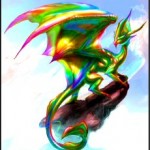
I once read an interesting blog from game designer Monte Cook about the challenge of pretending to be something that we are not. As I recall, it hits on some deep and powerful threads of human psychology. (Sadly I can no longer find the article, as the original page has long since been deleted.)
In essence, Monte discusses how we undergo a rapid change of self-awareness right around puberty, when we suddenly stop playing pretend and find the idea of roleplaying to be something of an identity crisis. This makes sense; it’s an age where everything we know about ourselves is challenged. Our bodies change, our thinking changes, and we become hyper-aware of how others must see us. As our hormonal changes incur initial sexual impulses, confusion and shame can add to the experience, making roleplaying – particularly casual, around-the-table-with-some-friends-(and-p
But for many of us, the power of immersive roleplaying is a palpable experience that we would not trade for anything in the depth of our adult lives. That same vulnerability is there, of course; once we become conflicted about our core identities, the fears attached to the issue never entirely dissolve. (Just ask Freud!) But we come to surround ourselves with people we trust and enjoy sharing that vulnerability with – people who won’t judge us because they are there for the same experience, to one degree or another. And “experience,” as Monte points out, is the point of the thing.
As a game master, I have a front-row seat to the intimate byplay of subsumed behaviors and enthusiastic involvement that characterizes my weekly game sessions. Players focus their considerable wills on realizing the hopes and dreams of a fictional personality, experiencing their triumphs and their losses, and integrating themselves in a group narrative that spins a story that none of them will ever forget. They get to do things that they will never have the chance to do in their everyday lives… leading armies, fighting dragons, experiencing grand romances and dark betrayals, and making decisions that can save the world or let it fall into ruin. It’s a powerful experience, with the right chemistry.
And because I’m also a psych major, I’ll discuss yet another fascinating aspect of immersion.
As an interesting addendum to the vicarious experiences which drive us to immerse ourselves in tabletop roleplaying, the study of cognitive psychology suggests a stronger relationship between imagination and experience than many of us realize. It’s plausible, in fact, that the ability to experience actual reality relies somewhat on our “imaginative” grasp of the experience. That is, after all, the mechanism which allows us to recall the experience in vivid detail.
As an example, neuroscientists have noted that an individual observing the behavior of another individual engaging in an activity the observer comprehends will experience activity in the very same sections of the brain as the other person. In essence, the observer engages his or her brain as if performing the activity him- or herself. They refer to this phenomenon as “mirror neurons.” As a guitarist, for example, I have noted that I will sometimes unconsciously move my fingers in a manner related to the movements of a guitarist I am watching perform. Technically, as far as my brain is concerned, I may as well be playing the instrument myself if I am truly immersed in the experience.
So… does that make it any clearer?
Sorry, the comment form is closed at this time.